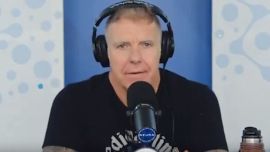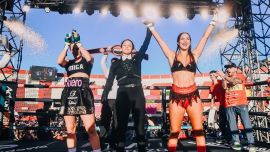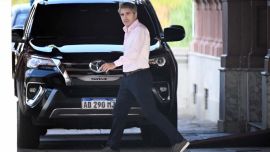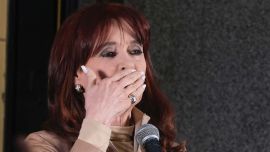President Mauricio Macri welcomed his Brazilian counterparty Jair Bolsonaro at the Casa Rosada this morning, where the two leaders announced that an agreement is imminent on the long-awaited and much-trailed free-trade agreement between the European Union and the Mercosur trading bloc.
Both Bolsonaro, the outspoken Brazil president, and President Macri expressed confidence that the deal would soon be signed as they met in Buenos Aires for talks.
"The signing of the Mercosur-EU accord is imminent," declared the Brazil leader, who has actively pushed for the free trade agreement since coming to office in January.
"Congratulations to your Excellency for that work," he said – a reference to Argentina's holding of the pro-tempore presidency of the Mercosur bloc.
"Everyone will win with this: Brazil, Argentina and the other countries in the bloc," added Bolsonaro, whose nation will take over leadership responsibilities after the bloc's next summit, scheduled for June.
Echoing that view, Macri said the two groups of nations were "very close to an agreement."
The Mercosur bloc, which currently groups together Brazil, Argentina, Uruguay and Paraguay, has been in negotiations with the EU since 1999 to establish a trade agreement. But 20 years of talks have failed to produce an agreement, despite both sides saying on several occasions that they were close to one.
The Macri administration said at the end of 2017 that they had hoped to clinch a deal on the occasion of a World Trade Organisation summit in Buenos Aires, but differences arose, especially over agricultural goods.
On Tuesday, however, Brazil's Economy Minister Paulo Guedes said an agreement could be reached in "three or four weeks."
European trade commissioner Cecilia Malmstrom on May 22 also said the two blocs were near an agreement, and expressed hope it could be reached before the current European Commission is replaced by a newly elected one.
The main obstacle has been European reluctance to open its market to agricultural products from South America, and more recently differences have emerged with Brazil over trade in meat, sugar and automobiles.
Speaking prior to the trip, Bolsonaro's spokesman Otávio Rêgo Barros said the Brazilian leader's visit would focus "on the strengthening of the economic brotherhood between Brazil and Argentina, based on the signing of a treaty between the European Union and Mercosur."
In an interview with local daily La Nación, Brazil's Foreign Minister, Ernesto Araújo, said it would be "possible to end the negotiations" with the European Union at a ministerial-level meeting scheduled to take place in late June in Brussels.
"The moment is now," Araújo said, pointing out that the "the two largest Mercosur partners [are] aligned, with the same vision of economic openness, competitiveness."
Economic challenges
The presidents also discussed ways to expand both countries' economies and reiterated their rejection of President Nicolás Maduro's regime in Venezuela. Both leaders have been fierce critics of the socialist government in Caracas, seeking to isolate Hugo Chávez's successor diplomatically.
"We are talking about the difficult moment that our Venezuelan brothers are living through," said Macri. "We ratify our commitment, our solidarity, and we will continue doing everything possible to help restore democracy in Venezuela."
During his 24-hour stay, Bolsonaro will also meet with officials from Congress and with business leaders with ties to the two nations. Ministers from both Cabinets were involved in today's meetings – Bolsonaro travelled with six of his ministers and 15 officials in total.
However, it's the economy that remains at the top of both nations' agendas, with both Brazil and Argentina attempting to kickstart their stuttering economies into gear.
Argentines are frustrated by a recession, a sharp depreciation of the peso and a high inflation rate. The crisis has fuelled protests against Macri, who will seek re-election in October.
Meanwhile in Brazil – even though he scored a big election victory last year – Bolsonaro is struggling to advance on his agenda and cope with a crashing currency. He has faced protests against plans for a spending freeze on education and has seen his approval ratings drop.
Brazil is its neighbour's most important trading partner, while Argentina's is third on its giant neighbour's list. In 2018, trade between both countries reached US$26 billion, with a surplus in Brazil's favour of US$3.9 billion. The relationship between the two nations is crucial – Guedes, Brazil's economy minister, said recently that "when one [economy] slows down, it hurts the other."
Bolsonaro used a press conference at the Casa Rosada to once again offer his support for Macri's re-election hopes. Previously, he had expressed concern about the popularity of ex-president Cristina Fernández de Kirchner in Argentina.
Addressing journalists, the ultra-conservative former Army captain – who has come under fire for derogatory remarks about Brazil's LGBT community – said the two "have the same ideals."
"We have practically the same ideals and that can be translated into what we want, which is the best thing in our countries. All of South America is worried about Venezuela, and we do not have new Venezuelans in the region," he said.
"I am going to make a call to the Argentine people. That God can bless them all, because they will have elections now in October and everyone has to have, as Brazil had, a lot of responsibility and much less emotion when deciding the future," said Bolsonaro.
In an interview prior to his arrival in Buenos Aires, the Brazilian leader said that he wanted "the Argentine people choose a centre-right candidate, as happened in Brazil and also in Paraguay, Chile, Peru and Colombia."
Decrying government corruption, Bolsonaro said "Argentina and Brazil can not return to the corruption of the past, [with] unbridled corruption for the pursuit of power."
He added: "I hope that the Argentine people reflect a lot on that for the elections. They will show if the people love freedom or not. It is in their hands."
First time
This is the first bilateral meeting between the two leaders since Macri travelled to Brasilia on January 16, two weeks after Bolsonaro assumed the presidency. The Cambiemos leader chose to skip his Brazilian counterparty's inauguration two weeks earlier, deciding instead to go on holiday.
The Brazilian leader arrived in Buenos Aires late Thursday morning. It is his first trip to the country. Unlike his predecessors as president, who all ensured their first overseas trip was to Argentina, the far-right former congressman decided to give Chile that honour. He also visited conservative allies in the United States and Israel before choosing to visit the Argentine capital.
Bolsonaro's first public act was to lay flowers at the foot of the Monument to the Liberator General San Martín in the Retiro neighbourhood. There, as he exited a vehicle, a handful of people had gathered to express their support or dismay for the Brazilian leader. Supporters chanted "Myth!", as is the custom in Brazil, while detractors branded him a "fascist" in song.
Activists in Argentina said they would stage demonstrations against Bolsonaro on Thursday evening. During his time in politics, Bolsonaro has disparaged other politicians, women, blacks and gays and posted fake stories about reporters, while declaring Brazil shouldn't be allowed to become "a gay paradise."
Gathering under the slogans "Argentina Rejects Bolsonaro" and "Your hatred is not welcome," human rights groups, social organisations and opposition politicians have called on porteños to come out in big numbers.
Demonstrators will gather at 6pm local time at the intersection of Avenida de Mayo and Avenida 9 de Julio, before marching onto the Plaza de Mayo in front of the Casa Rosada, where Bolsonaro arrived for talks and lunch with the president at around midday.
Expressing its disgust, Amnesty International Argentina sent a letter to President Macri warning him that "toxic words and the anti-rights rhetoric" of the Bolsonaro government "are already being turned into concrete measures in Brazil."
The organisation's executive director, Mariela Belski, wrote that "the hostile rhetoric toward human rights by the authorities [in Brazil] encourages the proliferation of hate speech, polarises society and could legitimise different violations of human rights."
"Faced with policies that threaten the rights to life, liberty, and the land of the Brazilian population, we sent a letter to president Macri so that...he can take into account human rights," an Amnesty official said.
During the visit, Argentina also agreed to contribute with security measures during the Copa América soccer tournament that will be held in Brazil between June 14 and July 7.
- TIMES/AP/AFP























Comments